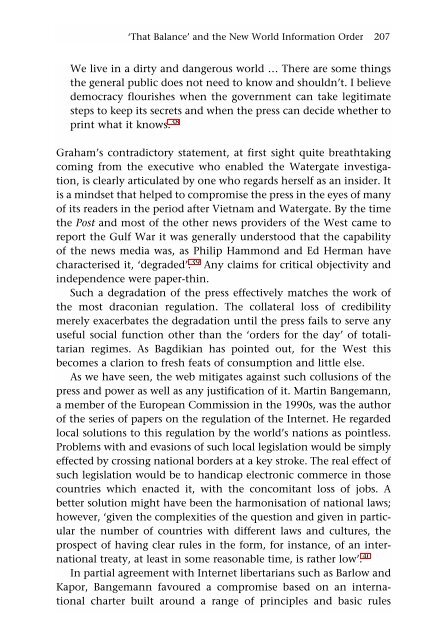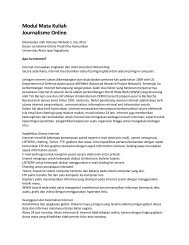Online Journalism - Ayo Menulis FISIP UAJY
Online Journalism - Ayo Menulis FISIP UAJY
Online Journalism - Ayo Menulis FISIP UAJY
You also want an ePaper? Increase the reach of your titles
YUMPU automatically turns print PDFs into web optimized ePapers that Google loves.
‘That Balance’ and the New World Information Order 207<br />
We live in a dirty and dangerous world … There are some things<br />
the general public does not need to know and shouldn’t. I believe<br />
democracy flourishes when the government can take legitimate<br />
steps to keep its secrets and when the press can decide whether to<br />
print what it knows. 38<br />
Graham’s contradictory statement, at first sight quite breathtaking<br />
coming from the executive who enabled the Watergate investigation,<br />
is clearly articulated by one who regards herself as an insider. It<br />
is a mindset that helped to compromise the press in the eyes of many<br />
of its readers in the period after Vietnam and Watergate. By the time<br />
the Post and most of the other news providers of the West came to<br />
report the Gulf War it was generally understood that the capability<br />
of the news media was, as Philip Hammond and Ed Herman have<br />
characterised it, ‘degraded’. 39 Any claims for critical objectivity and<br />
independence were paper-thin.<br />
Such a degradation of the press effectively matches the work of<br />
the most draconian regulation. The collateral loss of credibility<br />
merely exacerbates the degradation until the press fails to serve any<br />
useful social function other than the ‘orders for the day’ of totalitarian<br />
regimes. As Bagdikian has pointed out, for the West this<br />
becomes a clarion to fresh feats of consumption and little else.<br />
As we have seen, the web mitigates against such collusions of the<br />
press and power as well as any justification of it. Martin Bangemann,<br />
a member of the European Commission in the 1990s, was the author<br />
of the series of papers on the regulation of the Internet. He regarded<br />
local solutions to this regulation by the world’s nations as pointless.<br />
Problems with and evasions of such local legislation would be simply<br />
effected by crossing national borders at a key stroke. The real effect of<br />
such legislation would be to handicap electronic commerce in those<br />
countries which enacted it, with the concomitant loss of jobs. A<br />
better solution might have been the harmonisation of national laws;<br />
however, ‘given the complexities of the question and given in particular<br />
the number of countries with different laws and cultures, the<br />
prospect of having clear rules in the form, for instance, of an international<br />
treaty, at least in some reasonable time, is rather low’. 40<br />
In partial agreement with Internet libertarians such as Barlow and<br />
Kapor, Bangemann favoured a compromise based on an international<br />
charter built around a range of principles and basic rules
















